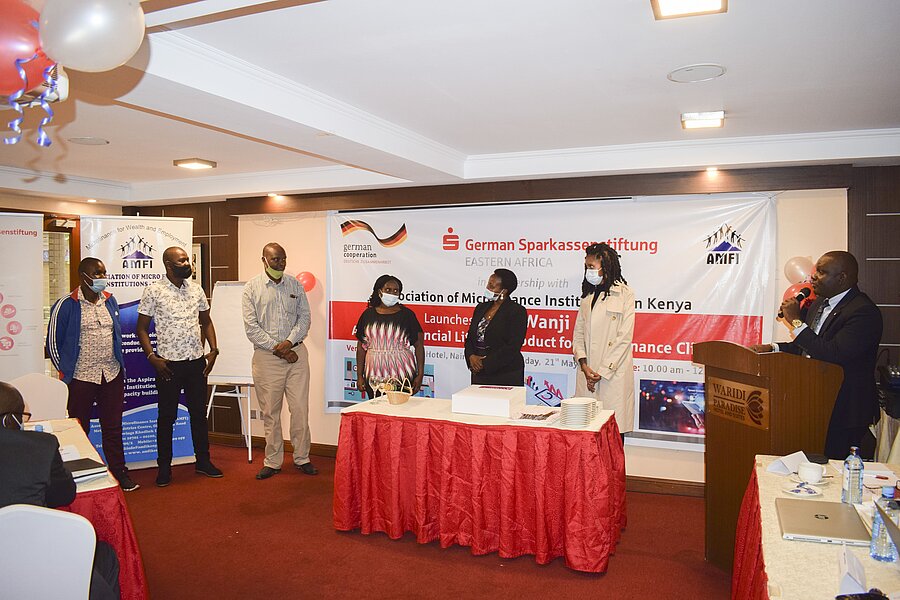Over the last decade, Kenya has been recognized globally for its digital focus in promoting financial inclusion. The wake of COVID-19 even gave further boost to adoption of digital solutions in microfinance sector to address challenges such as geographic remoteness, infrastructure impediment and lack of appropriate products and services that meet clients’ needs.
Exploiting the ‘opportunities’ COVID-19 pandemic presents allows for us to create a ‘more certain normal’ by developing projects and solutions that not only address challenges resulting from the pandemic but those that existed before the pandemic and those that are likely to arise from the inventions during the pandemic. This explains why German Sparkassenstiftung Eastern Africa (DSIK) has invested in a combination of quick, needs-based, highly practical, and high-impact interventions that leveraged on virtual solutions as an alternative mode of delivering services to its end beneficiaries in over 200 countries where it operates.
The journey to poverty eradication through financial inclusion is not a one man show. DSIK therefore recognizes all who have labored to bring light and hope to millions of Kenyans through a practical approach to better use of financial services. It takes note of the fact that national financial inclusion strategy is important but can only be realized by men and women with the conviction to bring positive change to excluded and vulnerable populations.
To ensure effective and sustainable financial inclusion; stakeholders must begin to align their focus to its complementary pillars such as financial education which unfortunately remains at a cross-road of other important policies and regulations. When financial education effectively empowers financial users to take better financial decisions and to understand not only the rights but also the obligations when using a financial service, then financial transactions will become sounder, meaningful, and beneficial to users. For this reason, DSIK supports the implementation of financial education programs for different market segments – small holder farmers, small business owners (MSMEs), rural dwellers, youth and children. This is achieved through training using uniquely designed simulation games that mimic their daily experiences and challenges and introduce them to their mitigation strategies hence contributing to a more financially resilient and aware society.
In addition, through its partners AMFI-K and ACCOSCA, the organization works with Cooperatives, SACCOs and Microfinance Institutions as multipliers to building basic financial management competencies and skills for the excluded populations by designing activities that inculcate a savings and responsible spending culture among them through introduction to topics such as Savings, Financial Emergencies, Debt Management, Book Keeping, Consumer Protection, Supply Management and Insurance as key drivers that enables a change in financial culture. DSIK Country director Mr. Otieno is therefore challenging the National Treasury, the Central Bank of Kenya and other key stakeholders to assign special budgets to promotion of financial education in the country to complement the array of existing interventions in microfinance and SACCO sectors.
The focus on digital financial literacy is particularly important to the organization because of the growing concerns related to consumer protection issues that emerge from the rather fast paced sprouting of digital financial services and digital lenders in Kenya. This makes digital financial literacy a thematic area with opportunities for further development. Its critical need is well amplified by the microfinance and SACCO sectors’ member institutions who have acknowledged that to ensure the sustainability of digital financial services for financial inclusion, there is the need to go beyond the generic approach to financial literacy and develop a specialized focus on digital financial literacy. The intention is not to re-design or replace the available financial education solutions, but to encourage a targeted approach to the development of the knowledge and capability of consumers in the effective and safe use of financial services.
To this end, DSIK – Kenya through the leadership of its Capacity Development and Financial Education Advisor, Mercy Adero, worked closely with AMFI-K to pioneer the development of the first Interactive Voice Response (IVR) digital financial literacy product specifically tailormade to address the financial literacy needs of microfinance clients. To address most probable challenges, ensure inclusivity and equal access by targeted end beneficiaries, the platform is accessed through a free hotline, is translated into Kiswahili- Kenya’s local language and designed to be accessed by clients at their convenience at the comfort of their homes or workplaces.
The organization’s Country Director Mr. Otieno, together with AMFI-K’s CEO Caroline Karanja launched the product on the 21st of May 2021 to ensure microfinance clients are well equipped with basic financial management knowledge, make better financial decisions and be positioned for a more stable future financially. Present were the developer of the product VIAMO, Faulu MFB, Juhudi Kilimo and Musoni microfinance institutions and their clients. All the parties present were very enthusiastic about the product and expressed their confidence in its content, design, appropriateness and timeliness for the microfinance sector and its clients. More specifically, the representatives from the institutions described it a universal product that meets the financial education needs of their clients at a click of a button since most of them share clients. The clients on the other hand said it is a simple, easy to use and convenient tool that meets and addresses their needs
The two organizations DSIK and AMFI-K remain committed to taking proactive steps towards collaborating with stakeholders to formulate relevant policies to sustainably use financial education for market segments mentioned above as one of the tools for supporting sustainable financial inclusion in Kenya.
Article by: Mercy Adero – Capacity Development and Financial Education Advisor – DSIK in Kenya.

